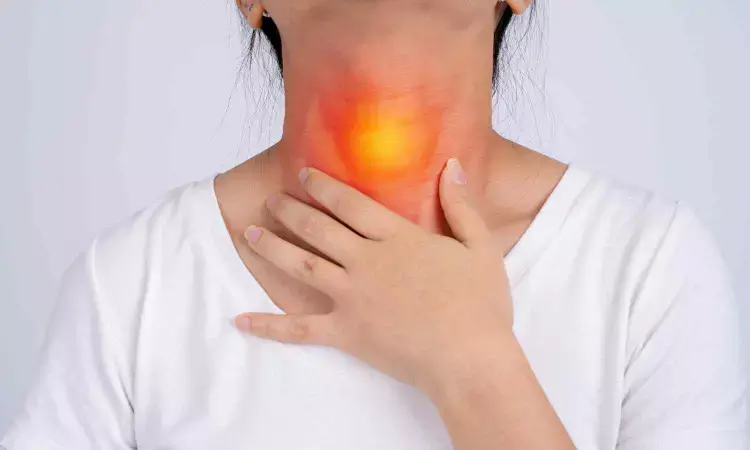- Home
- Medical news & Guidelines
- Anesthesiology
- Cardiology and CTVS
- Critical Care
- Dentistry
- Dermatology
- Diabetes and Endocrinology
- ENT
- Gastroenterology
- Medicine
- Nephrology
- Neurology
- Obstretics-Gynaecology
- Oncology
- Ophthalmology
- Orthopaedics
- Pediatrics-Neonatology
- Psychiatry
- Pulmonology
- Radiology
- Surgery
- Urology
- Laboratory Medicine
- Diet
- Nursing
- Paramedical
- Physiotherapy
- Health news
- Fact Check
- Bone Health Fact Check
- Brain Health Fact Check
- Cancer Related Fact Check
- Child Care Fact Check
- Dental and oral health fact check
- Diabetes and metabolic health fact check
- Diet and Nutrition Fact Check
- Eye and ENT Care Fact Check
- Fitness fact check
- Gut health fact check
- Heart health fact check
- Kidney health fact check
- Medical education fact check
- Men's health fact check
- Respiratory fact check
- Skin and hair care fact check
- Vaccine and Immunization fact check
- Women's health fact check
- AYUSH
- State News
- Andaman and Nicobar Islands
- Andhra Pradesh
- Arunachal Pradesh
- Assam
- Bihar
- Chandigarh
- Chattisgarh
- Dadra and Nagar Haveli
- Daman and Diu
- Delhi
- Goa
- Gujarat
- Haryana
- Himachal Pradesh
- Jammu & Kashmir
- Jharkhand
- Karnataka
- Kerala
- Ladakh
- Lakshadweep
- Madhya Pradesh
- Maharashtra
- Manipur
- Meghalaya
- Mizoram
- Nagaland
- Odisha
- Puducherry
- Punjab
- Rajasthan
- Sikkim
- Tamil Nadu
- Telangana
- Tripura
- Uttar Pradesh
- Uttrakhand
- West Bengal
- Medical Education
- Industry
Can a Mouthwash-based Test Help Predict Head and Neck Cancer Recurrence?

For years, mouthwash has been marketed as an essential hygiene item to prevent bad breath, even though it offers minimal if any health benefits.
But what if a mouthwash-based test to detect biomarkers can help physicians predict disease recurrence in head and neck cancer patients?
That futuristic scenario seems closer to reality after a new study by researchers at Sylvester Comprehensive Cancer Center at the University of Miami Miller School of Medicine, UC San Diego Health and collaborating cancer centers.
Their findings, published in the peer-reviewed journal JAMA Otolaryngology – Head & Neck Surgery, could improve how physicians predict and detect recurrence with these cancers.
“Our study suggests biomarker detection in saliva collected from an oral rinse after initial treatment offers potential to readily assess recurrence risk,” said Elizabeth Franzmann, MD, a head and neck surgeon at Sylvester, and co-corresponding author of the study. “Elevated levels of either of two biomarkers were associated with disease return.”
Men More Susceptible
Head and neck cancers account for nearly 4% of all cancers in the U.S. and are more commonly diagnosed in people over age 50, according to the National Cancer Institute. Men are more than twice as likely to be diagnosed with the disease.
Primary treatment options include surgery and radiation, which can affect speech, swallowing and appearance, severely affecting a patient’s quality of life. These effects can be even worse after recurrence.
Moreover, recurrence is not always easy to catch. “It can be very difficult to determine if what you’re observing is just post-treatment changes or a cancer recurrence,” explained Joseph Califano III, MD, director of UC San Diego’s Hanna and Mark Gleiberman Head and Neck Cancer Center and the study’s co-corresponding author. “Good biomarkers could help remove some of the guesswork.”
Franzmann, whose research lab is focused on finding an inexpensive, noninvasive screening test for these cancers, emphasized the importance of early recurrence detection. “These patients suffer terribly,” she said. “The more we can minimize those effects by catching recurrence early, the better we can mitigate patient morbidity and mortality.”
Assessing Recurrence Risk
Previously, Franzmann and her team had studied how biomarkers in oral rinses can assess a person’s risk for developing oral or oropharyngeal tumors, the most common types of head and neck cancers. They found a link with two key biomarkers – CD44, a tumor-initiating molecule, and total protein levels.
In this new study, the researchers studied whether those two biomarkers could predict recurrence in already-diagnosed patients. Their clinical trial evaluated the effects of CD44 and total protein levels in 160-plus patients across multiple cancer centers. Patients were provided oral-rinse samples for use up to 18 months after their initial treatment.
To measure biomarker presence, the researchers used laboratory tests and experimental lateral-flow tests, technology similar to stick-based pregnancy and COVID-19 tests.
“Our laboratory assays showed an association between biomarker levels and later recurrence,” Franzmann said. “Compared to patients with normal protein levels three months after treatment, patients with about twice as much total protein had an estimated 65% greater risk of recurrence.”
She added that patients with CD44 levels that were triple the normal level had an estimated 62% percent greater recurrence risk.
Focus on Rapid Tests
The study also generated early data on a rapid, point-of-care test to measure these biomarkers, with the findings expected to help hasten its development.
“It would be really useful if we had a test that was inexpensive and could be performed and resulted while the patient was in the office,” said Franzmann. “That’s the area we are focusing on.”
Reference:
Oral Rinse CD44 and Total Protein Levels Are Associated with Oral & Oropharyngeal Cancer Recurrence, JAMA Otolaryngology – Head & Neck Surgery DOI: 10.1001/jamaoto.2924.2490
Dr Kamal Kant Kohli-MBBS, DTCD- a chest specialist with more than 30 years of practice and a flair for writing clinical articles, Dr Kamal Kant Kohli joined Medical Dialogues as a Chief Editor of Medical News. Besides writing articles, as an editor, he proofreads and verifies all the medical content published on Medical Dialogues including those coming from journals, studies,medical conferences,guidelines etc. Email: drkohli@medicaldialogues.in. Contact no. 011-43720751


